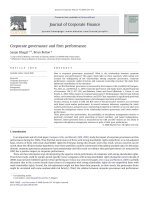influence of corporate social responsibility disclosure on corporate governance and company performance
Bạn đang xem bản rút gọn của tài liệu. Xem và tải ngay bản đầy đủ của tài liệu tại đây (337.78 KB, 58 trang )
i
INFLUENCE OF CORPORATE SOCIAL RESPONSIBILITY DISCLOSURE
ON CORPORATE GOVERNANCE AND COMPANY PERFORMANCE
BY
LE ANH CONG
Graduation Project Submitted to the Department of Business Studies, HELP
University College, in Partial Fulfillment of the Requirements for the Degree of
Bachelor of Business (Accounting) Hons
ii
OCTOBER 2010
Declaration of Originality and Word Count
DECLARATION
I here by declare that this graduation project is based on my original work except for
quotations and citation which have been duly acknowledged. I also declare that it has not
been previously or concurrently submitted for any other courses/degrees at HELP
University College or other institutions. The word Count is 10,093 words.
LE ANH CONG
28 October, 2010
iii
Acknowledgement
This project would not have been made possible without the assistance, support and
encouragement of many people. I wish to take this opportunity to thank all the people
who have helped me during the time of completing the dissertation.
Firstly, I would like to express my deep gratitude to my supervisor Dr. Nguyen Thi
Phuong Hoa at the National Economics University (NEU) of Viet Nam . SHe has kindly
helped me and supported me all the way through. For that, I am very grateful. I also
would like to express my thank to Ms. Sumathi and Ms. Shenba at Help University
College, who initiated the project and give so much instruction and support.
LE ANH CONG
iv
Abstract
INFLUENCE CORPORATE SOCIAL RESPONSIBILITY DISCLOSURE ON
CORPORATE GOVERNANCE AND COMPANY PERFORMANCE
BY
LE ANH CONG
October 2010
Supervisor: Nguyen Thi Phuong Hoa
Corporate social responsibility (CSR - Corporate Social Responsibility) is a growing
trend in the world but is still very new in Vietnam, only focused on footwear and apparel
industries due to the needs of the customer orders overseas. Vietnam is clearly hard
goods that can compete on price or quantity with China, that way I can help local
businesses get the advantage in a difficult war in this market? CSR may be the answer if
your business really understand the meaning and turn into a CSR culture, thinking and
working methods. The objective of the research is to assess the understanding of
Vietnamese individual businessmen on the topics of CSR. Besides, the research also
businessmen wants to define which major factors contributing to the CSR importance by
asking respondents‟ understanding and opinion on CSR . Besides that, the business in
Viet Nam find hard to use CSR as a tool to value firm and it is also difficult for them to
make investment decision when CSR issues are mentioned.
v
TABLE CONTENT
Declaration of Originality and Word Count ii
DECLARATION ii
Acknowledgement iii
Abstract iv
LIST OF FIGURES AND TABLES viii
LIST OF ABBREVIATIONS ix
CHAPTER 1 : INTRODUCTION 1
1.1 Research background 2
1.2 CSR in Viet Nam 3
1.3 Problem Statement 4
1.4 Objectives of Research 5
1.5 Research Methods 6
CHAPTER 2 : LITERATURE REVIEW 7
2.1 Definition of CSR 8
2.2 Caroll’s concept 9
2.3 The concepts related to CSR 11
2.3.1 Business Ethics 11
2.3.2 Corporate culture 11
2.3.3 Socially responsible investing 12
2.3.4 Sustainability investing 12
2.4 Stakeholder theory 12
2.5 Legitimacy Theory 13
vi
2.6 Institutional Theory 13
2.6 Tripple bottom line 14
2.7 CSR reporting 14
2.8 CSR’s impacts on accounting 15
CHAPTER 3: RESEARCH METHODOLOGY 16
3.1 Research Objectives 17
3.2 Theoretical framework and measurement 17
3.2.1 Corporate governane 17
3.2.2 Links between CG and CSR 18
3.2.3 Global Reporting Initiative (GRI) 18
3.3 Research methodology 19
3.4 Data sources 19
3.4.1 Primary data 19
3.4.2 Secondary data 20
3.5 Research method 20
3.6 Research tool 20
3.7 Limitations 21
CHAPTER 4 : ANALYSIS 22
4.1 Description of Result 23
4.1.1 Age 23
Table 1 : Age 23
4.1.2 Gender 23
Table 2 : Gender 23
4.1.3 Corporate governance 24
vii
4.1.4 Links between Corporate governance and Corporate social responsibility
28
4.1.5 Global Reporting Initiative 31
4.2 Result Analysis 33
4.2.1 Assessment of CSR/ CSR practices 33
4.2.2 Assessment of the CG – CSR Link 35
4.2.3 Global Reporting Initiative 35
CHAPTER 5: CONCLUSION AND RECOMMENDATION 37
5.1 Conclusion 38
5.2 Recommendation 39
5.3 Limitation of Sutdy 40
5.4 Suggestion for Furture Research 40
REFERENCES ( Harvard referencing system) 41
APPENDICES 47
Appendix A: Questionnaire Sample 47
viii
LIST OF FIGURES AND TABLES
Figure 2.1. A hierarchy of CSR (adapted from Carroll, 1991) 9
Table 1 : Age 23
Table 2 : Gender 23
Table 3 : Question 1 - Description of Result 24
Table 4 : Question 2 - Description of Result 25
Table 5 : Question 3- Description of Result 26
Table 6 : Question 4- Description of Result 27
Table 7 : Question 5 - Description of Result 28
Table 8 : Question 6 - Description of Result 29
Table 9 : Question 7 -Description of Result 30
Table 10 : Question 8 - Description of Result 31
Table 11 : Question 9 - Description of Result 32
Table 12 : Question 10- Description of Result 33
ix
LIST OF ABBREVIATIONS
CG Corporate governance
CSR Corporate Social Responsibility
GRI Global Reporting Initiative
SI Sustainability investing
SRI Socially responsible investing
TBL Triple Bottom Line
VCCI Chamber of Commerce and Technology of Vietnam
WBCSD World Business Council for Sustainable Development
WTO
World Trade Organization
1
CHAPTER 1 : INTRODUCTION
1.1 Research background
1.2 CSR in Viet Nam
1.3 Problem Statement
1.4 Objectives of Research
1.5 Research Methods
2
1.1 Research background
In the World, CSR has been acknowledged as a factor to develop a reputation of a
company in the global market. CSR became the main factor to consider in the decision
of enterprises to invest responsibly. Social responsibility is considered as an important
factor as the other traditional factors such as cost, quality and progress in business.
Social responsibility is integrated into business strategy and becomes a prerequisite for
enterprises to survive and grow. CSR refers to business relationships with stakeholders
including government, business, labourers, community, society and development
organizations. CSR focuses on labor issues and the environment. CSR-based businesses
will gain many benefits such as improved labor relations, reduced occupational and rate
holiday, increased labor productivity, and engagement of workers to the enterprise. CSR
is often related to the enterprise‟s commitment to balance different interests of
stakeholders so that it can contribute to sustainable development. Some aspects of CSR
include environmental protection, security, labor and business rights of the community
standards of participation, markets, business and economic development, health and
education and leadership development. The CSR concept relates closely to corporate
citizenship, corporate social responsiveness, corporate social performance and
stakeholder management. In this sense, CSR generally refers to business-decision
making which is related to ethical values, compliant to law and regulations, and respect
for people, communities and the environment. Social responsibility is a business
process applications that aim to meet or exceed to meet the requirements and
expectations of stakeholders about the economic benefits, environmental performance
and social impact. There are three important concepts should be considered in order to
achieve sustainable development: economic growth, ecological balance and the
3
evolution of society. With the process of social responsibility, business can contribute to
the objectives of sustainable development through the local association of their activities
with the community to achieve positive results for all parties. Aligning CSR concepts
into daily operations bring many benefits to the enterprise. For small and medium
enterprises in Vietnam, the application of the concept of CSR can bring significant
benefits in the market, signing or extending contracts with customers, including
international organisations and customers. Productivity of the enterprises can be
enhanced through the improvement of working conditions of workers. Benefits of
adopting CSR for businesses are substantial. First, the responsibility of investors
indicated correspond to the performance and social environment of a business. The
positive response of investors, in the developed countries and developing countries, is
seen as the environmental performance of organizations as well. Similarly, the
organization is a multinational operation focused performance and the social
environment of potential partners before choosing investments. The underlying trend of
investment in the future will require the Vietnamese enterprises to look at the
application of CSR.
1.2 CSR in Viet Nam
Becoming a member of WTO is synonymous with joining in an international playing
field with many new, harsh rules to comply with. Besides, globalization has made the
fact that the company‟s targets are not only profit but also contribution to the society.
From this point of view, in the respect of strategy, CSR has a compulsory meaning in
making reliable social standards for decision- making process of companies. However,
the concept of CSR is still relatively new in Vietnam, so the application remains limited.
According to research by the World Bank in Vietnam, barriers and challenges to the
4
implementation of CSR include: 1) awareness of CSR is still limited, 2) lack of financial
resources and technical capacity to implement standards CSR (especially for small and
medium-size enterprises). Therefore, in Vietnam, the government has improved the
awareness of businessmen and concerned sides about CSR, and made CSR an important
part in the agenda of steady development. International organizations in Vietnam have
exerted all their strength to push up and extend CSR. The programs and projects
concerned in CSR concentrate on important contents of CSR depending on the projects
targets, resources and experiences. Those contents including: working conditions, safety,
hygiene, environment, quality and productivity, labor relations and manpower resources
management. Services to advise and issue certificates for administration systems has
expanded for example: the administration system of quality (ISO 9000), the
administration system of environment (ISO 14000), labor and social responsibility (SA
8000).
1.3 Problem Statement
In the era of globalization, businesses are not only representing themselve but also the
face of the country. Therefore, social responsibility is not floating pool, not as an aspect
of "plus" that is the nature of the business. Because, just good ethics is good business ,
that is, the more businesses have much social responsibility, the more likely that much
more profitable and againsts. So the question is how to improve the implementation of
activities of social responsibility of enterprises. However, in economic development like
Vietnam, it seems that most small and medium-scale enterprises have not been focused
and interested in adopting and implementing CSR. Typical, examples are contaminated
milk in China and the direct discharge of untreated waste into the Thi Vai River of
Vedan Viet Nam company . However, some enterprises have put CSR into their business
5
strategies. Typically, the social programs such as "six million cups of milk to children of
Vietnam" and the scholarship fund "firefly light" of big brands like Vinamilk, Dutch
Lady resonate and are consumer support . HUB Cafe is one of the enterprises are small
and medium-scale implementation of CSR by creating a community library with more
than 10,000 volumes of customer service. HUB is being built as a place to share
knowledge and materials to help students and conduct research, organize events, and the
assembly agreed on issues of education, work experience and career. Therefore, the most
difficult of Vietnam enterprises at present is the information leads to confusion not know
where to start before the jobs related to CSR. To promote the implementation of social
responsibility of enterprises, it is best to have an association or organization to monitor
and advise businesses.
1.4 Objectives of Research
According to Nguyen Hong Ha Deputy director of the Chamber of Commerce and
Technology of Vietnam (VCCI) in Ho Chi Minh, CSR must be placed on the business
strategies of each business. CSR has been and will be an essential part to the success of
some business enterprises. The application of CSR has created a more stable and
productive business . Moreover, the enterprises received support from consumers and
society in the common interests that bring businesses to the community. To succeed in
the application of CSR in Vietnam, the first business owners to deploy, implement CSR
exploited for their labor as the observance of laws on wages policy, social insurance,
employment contract to build a relationship based on trust and goodwill with business
workers.
6
1.5 Research Methods
The first aim of this study is to provide a theoretical framework for understanding the
completed concept of CSR and other relevant components under this area. In general,
the CSR is a concept that offers to companies their opportunity to treat environmental
and social problems as a part of their business operations. The second aim of this study
is to evaluate the impact of corporate social responsibilities in Viet Nam. Four questions
are developed and tried to explain including: Why should enterprises implement social
responsibility? Which are benefit of implementation of social responsibility. How is the
situation of implementing social responsibility of Vietnamese enterprises at present?
Which are solutions to improve the social responsibility of business?
7
CHAPTER 2 : LITERATURE REVIEW
2.1 Definition of CSR
2.2 Caroll’s concept
2.3 The concepts related to CSR
2.3.1 Business Ethics
2.3.2 Corporate culture
2.3.3 Socially responsible investing
2.3.4 Sustainability investing
2.4 Stakeholder theory
2.5 Legitimacy Theory
2.6 Institutional Theory
2.7 CSR reporting
2.8 CSR’s impacts on accounting
8
2.1 Definition of CSR
In the current economic integration, social responsibility (CSR - Corporate Social
Responsibility) is becoming a concept many people are interested and have strategic
importance for business. It refers to CSR is not only the right thing to do "but also" wise
to do ". So to understand exactly what is CSR? There have been numerous definitions
given as "Social responsibility implies improving the behavior of the business to a level
consistent with the norms, values and social expectations are common" (Prakash, Sethi,
1975). Or "social responsibility of enterprises, including the expectations of society on
economic, legal, ethics and philanthropy for organizations in a given time" (Archie.B
Carroll, 1979) . Maignan and Ferrell also introduced the concept of their own concise
about CSR: "A business with social responsibility in deciding and its operators to create
and balance the different interests of individuals and groups related bodies. "
There are many different definitions to explain CSR, but one of the definitions are used
most commonly defined by the World Business Council for Sustainable Development
(WBCSD) launched "CSR is the commitment of business to contribute to sustainable
economic development, through the compliance standards of environmental protection,
gender equality, labor safety, labor rights, fair pay, training and staff development,
community development in ways that benefit both businesses as well as the overall
development of society ". In the increasingly fierce competition, demanding customers
from the growing social and increasingly strict view of the business enterprises to
sustainable development must always abide by the standards of protection natural
environment, work environment, gender equality, labor safety, labor rights, training and
employee development, contributing to community development.
9
2.2 Caroll’s concept
CSR is becoming more common. But still there are many different views on the concept,
content and scope of CSR. Among them, the "pyramid" by Caroll (1999) is the most
comprehensive and the widely used. Accordingly, the CSR includes economic, legal,
ethical and discretionary .
Figure 2.1. A hierarchy of CSR (adapted from Carroll, 1991)
The first category Caroll mentioned is economic aspects. Economic aspects of social
responsibility of business is to produce goods and services that society needs and wants
at a price businesses can maintain it and to satisfy obligations of the business with
investors are looking for sources of labor supply, discover new resources, promoting
advances in technology, product development, distribution is the source of production of
goods and services, such as how social system. In conducting this work, businesses
actually contribute to increased social welfare, ensure the existence and development of
the business. For workers, the economic aspect of business is to create jobs with
remuneration deserve equal job opportunities, job opportunities and professional
development, adequate remuneration, environmental effects labor safety and hygiene
and ensure the privacy and individuals in the workplace. For consumers, the economic
10
responsibility of business is to supply goods and services, economic responsibility of the
business also related to issues of quality, product safety, pricing, information on product
(advertising), distribution, sales and competition. Economic aspects of social
responsibility of a business is the basis for the operation of the business. Most of the
economic obligations in business are institutionalized into the legal obligations. The
second part, legal aspects. Legal aspects of the social responsibility of a business
enterprise is to fully implement the provisions on the formal legal for the parties
concerned. Things like this law will regulate competition, consumer protection,
environmental protection, promote fairness and safety initiatives and provides protection
against misconduct. The legal obligation is expressed in civil and criminal law.
Basically, legal obligations, including five aspects: (1) Regulatory competition, (2)
Consumer Protection, (3) Environmental Protection,(4) Safety and Equality, (5)
Encourage detect and prevent misconduct. Through legal liability and social force
members must implement the behavior is acceptable. Organizations can not survive long
if they do not perform their legal responsibilities. Ethical dimensions of social
responsibility of a business are the acts and activities that society wants to exist in the
business but not defined in the legal system, not been institutionalized into law. This
aspect is related to what the company decides to be true, fair, beyond the legal
requirements are tight, it just acts and activities that members of organizations,
communities and society expect from the business even though they were not written
into law. Ethical dimensions of a business is often expressed through the principles and
moral values are presented in this respect the mission and strategy of the company.
Through this publication, principles and moral values become the lodestar for the
concerted action of each member of the company and with our stakeholders. The final
11
category, discretionary aspect: Responsibility is the charitable acts of the business
beyond the expectations of social support such as donations to the poor people, funding
scholarships, contributions to community projects. The difference between charity and
responsible business ethics is entirely voluntary.
2.3 The concepts related to CSR
2.3.1 Business Ethics
Business ethics is expressed as the standards and principles are social as well as the
business world recognizes, as the rules of behavior, the professional relationship
between managers with one another, or between managers value to society in the
process of conducting business activities, allowing managers to behave honestly and
responsibility to the community and with each other. Business ethics is a manifestation
of the balance between the interests of managers in implementing the business
objectives with the interests of the employees work for managers, customer benefits, the
partners and the interests of the community in general
2.3.2 Corporate culture
Corporate culture is full of cultural values should be build during the existence and
development of a business, become the values, perceptions and practices, rooted in
traditional activities of enterprises and govern her feelings, thinking and behavior for all
members of the business in the pursuit and implementation purposes. Corporate culture
is the product of the same work in a business and meet the needs of sustainable value.
Corporate culture also contributed to the difference between business and considered
separately each of the traditional enterprise.
12
2.3.3 Socially responsible investing
Socially responsible investing – the growing social expectations of shareholders.
Socially responsible investing (SRI) brings together all of the approaches which consist
in integrating non-financial criteria (social, environmental and societal) in decisions
involving funds and portfolio management.
2.3.4 Sustainability investing
Sustainability investing( SI) is the explicit recognition that social, economic,
environmental, and ethical factors directly affect business strategy, for example, how
companies attract and retain employees, how they manage the risks and create
opportunities from climate change, a company‟s culture, corporate governance
standards, stakeholder-engagement strategies, philanthropy, reputation, and brand
management.
2.4 Stakeholder theory
Stakeholder Theory focuses on how an organisations interact with particular stakeholder
groups. There are two categories of Stakeholder Theory: the ethical ( or normative)
branch and the managerial branch. Under the ethical branch of Stakeholder Theory,
there is a view that disclosures are responsibility driven and that all stakeholders that are
impacted by the operations of the entity have a right to information about its operations.
Therefore, under this perspective, social responsibility disclosures are made in response
to an ethical responsibility, rather than in response to any desire to maximise wealth or
to appease particular, powerful parties. By contrast, under the managerial branch,
disclosures are used as one strategy to control the actions of powerful stakeholders.
Powerful stakeholder are often considered as those parties who have resources which are
important to the ongoing survival of the organisation. Under this perspective , it is the
13
needs of the powerful stakeholders that are attended to over and above the needs of other
parties affected by the entity‟s operations. If the powerful stakeholders expect social
responsibility disclosures then the firm is predicted to make them.
2.5 Legitimacy Theory
Legitimacy Theory relies on the notion of a social contract, which is an implied contract
respresenting the norms and expectations of the community in which an organisation
operates. An organisation is deemed to be legitimate to the extent that it complies with
the terms of social contract. Hence, various responsibility disclosures will be made in an
effort to make legitimate the ongoing existence of the organisation. Legitimacy theory
could also explain the effect of culture on CSR reporting. This theory explains the
association between accounting and society from a company‟s perspective. A company
would voluntarily report on activities if management perceived that the particular
information is demanded by the societies which it operates (De Villiers and Van Staden,
2006).
2.6 Institutional Theory
Institutional Theory provides a number of reasons why corporations might make
corporate social responsibility disclosurse. It explains that managers will be subject to
pressures to change or adopt certain voluntary corporate reporting practices. Institutional
theory is also capable of explaining the influence of culture and CSR reporting. Literature
shows that CSR activities, which are institutionalised in particular firms resulting in an
improved amount and quality of disclosure (Rahaman 2004; Amran and Devi, 2008). CSR
activities in these firms are related to the institutionalised values, and these values are
influenced by cultural variables (Waldman, 2006). There are two main dimensions to
Institutional Theory. The first of these is termed “ isomorphism” while the second is
14
termed “ decoupling” . Both of these can be of central relevance to explaining voluntary
corporate reporting practices.
2.6 Tripple bottom line
Triple bottom line (TBL) – part of a CSR, is one of the mechanisms advocated for
reporting on CSR. Tripple bottom line reporting has been defined by Elkington (1997)
as reporting which provides information about the economic, environmental and social
performance of an entity. The notion of reporting against the three components ( or “
bottom lines”) of economic , environmental and social performance is directly tied to
the concept and goal sustainable development.
2.7 CSR reporting
CSR report can be a framework to present a good image for the shareholders and
stakeholders. CSR reporting is positively related to the activities of companies and
enterprises are paying more attention to such reports. CSR reporting framework is to
improve corporate governance and competitive advantage to achieve sustainable
development. Carroll & Buchholtz (2000) comment on the finding that CSR has brought
some changes in the relationship business and social approach to stakeholder
management is a necessary response. CSR reporting has increased significantly
improved with the period from 2002 to 2005. CSR reporting form has seen a big change
from full environmental report for sustainable development (including issues of social,
environmental and economic). Businesses with annual CSR reports agree that business
should look at CSR as one of two aspects for business solutions such as reducing risk
and create competitive advantage. CSR has just such an exception in social ethics and an
exception to exist and compete in business.
15
2.8 CSR’s impacts on accounting
Social responsibility of business is an inevitable issue associated with business. It may
gives companies significant advantages such as: brand confirmed in customer's business
and increased corporate profits. Social responsibility of enterprises plays the role of
tectonic customer loyalty with great moral values "style", and it will polish the names of
enterprises, and assert that the brand is good cause felt in the heart of people, they will
sell many times more. Confirmed brand : In times of strong brands that are seen as a tool
to create unique competitive advantage for businesses, then "faith becomes necessary.
Business ethics and social responsibility became the foundation for the really build a
strong brand. Increased corporate profits: Respect social morality and implement ethical
business behavior is investing in increased profitability and sustainable development of
enterprises. Keep its reputation with clients, customers, employees, communities and
government may create more business opportunities for enterprises and business
connections to keep customers, employees and this creates opportunities for businesses
can generate much more profit.
16
CHAPTER 3: RESEARCH METHODOLOGY
3.1 Research Objectives
3.2 Theoretical framework and measurement
3.2.1 Corporate governance
3.2.2 Links between CG and CSR
3.2.3 Global Reporting Initiative (GRI)
3.3 Research methodology
3.4 Data source
3.4.1 Primary data
3.4.2 Secondary data
3.5 Research method
3.6 Research tool
3.7 Limitations
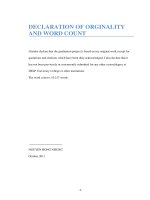

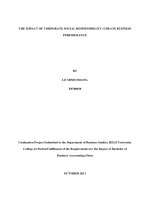
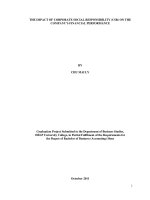
![brown and calor - 2004 - the correlation between corporate governance and company performance [cgs-fp]](https://media.store123doc.com/images/document/2015_01/02/medium_izzlTXr0MM.jpg)
![brown, caylor - 2006 - corporate governance and firm performance [cgs-gov-score]](https://media.store123doc.com/images/document/2015_01/02/medium_odt1420194779.jpg)
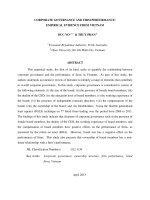
![brown, caylor - 2006 - corporate governance and firm performance [cgs-gov-score]](https://media.store123doc.com/images/document/2015_01/06/medium_dhs1420548411.jpg)
